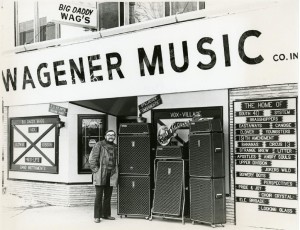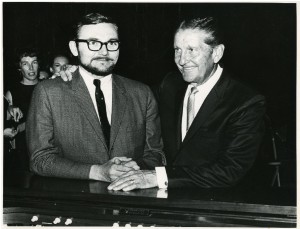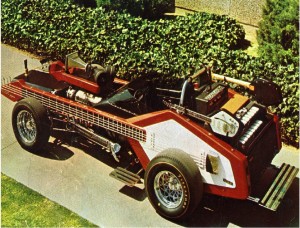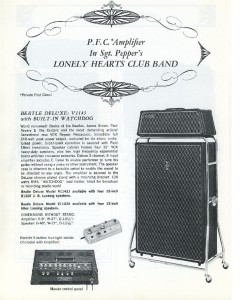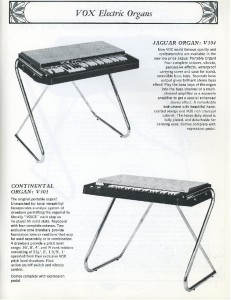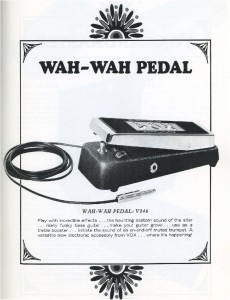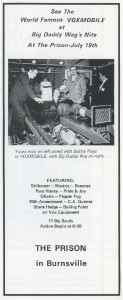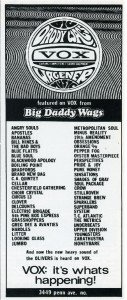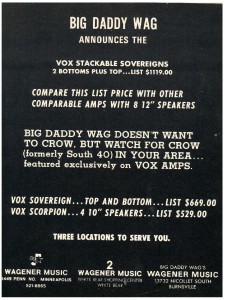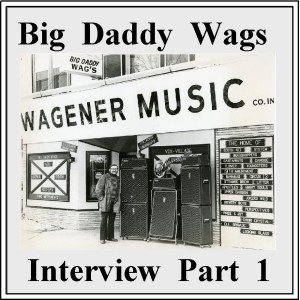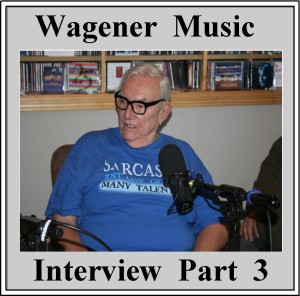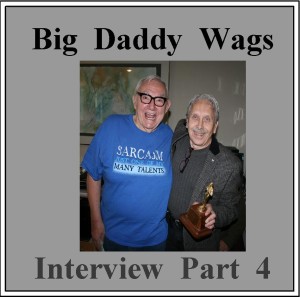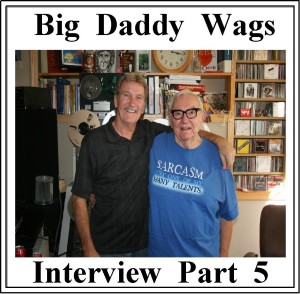Big Daddy Wags – Wagener Music
Paul and Charlie Wagener open Wagener Music in North Minneapolis which becomes a popular place for local musicians to hang out
Contents:
History
Paul Wagener (“Big Daddy Wags”) and Wagener Music
Paul Wagener was born on August 20, 1938 and grew up in Waconia, a suburban area Southwest of the Minneapolis metro area. By the time Paul graduated from Waconia High School in 1956, he was well aware of Bill Haley and the Comets and the “new” rock’n’roll sound spreading across the country. In the later 1950’s, Paul had scene Augie Garcia perform live on the weekends at “Sherman Station” (a liquor store) near Winstead. Like many small towns across Minnesota, Waconia had their own ballroom, the Paradise Ballroom, which featured “old time” bands and during the season of Lent, the ballroom was used for roller skating. Dancing during Lent was not considered appropriate at that time, in a town built by mainly German immigrants.
Paul decided to learn to play the Trumpet and was soon in a band called The Restless Rockers. The lineup was: Paul on trumpet, his brother Charlie Wagener on piano; Nordal Schmunkee on tuba; and Jim Broback on baritone sax; Norm on bass guitar; and Charlie Gamarick on trumpet. The “Rockers” played old time music plus Rock’n’Roll, mainly “Rock Around the Clock” by Bill Haley and the Comets. The band scored a job at the Paradise Ballroom for a teen dance and fund raiser for a local hot rod club called The Cam Snappers. The “Rocker’s” played the Bill Haley hit song sixteen times during the night.
Paul had an offer to join an old time band headed by Ivan Kale, a local trumpet player, however his mother would not agree to this.
In addition to playing piano and teaching school in South Minneapolis, Charlie Wagener also gave private piano lessons, mainly to the local students. Charlie wanted to start a music store in order to supply his students with instruments. Charlie had purchased some instruments from Hageland’s Music Store (a wholesale store) in North Minneapolis. Through Meryl Kirsch, who distributed records to Target for Heilicher Brothers, Paul and Charlie had gotten to know Amos Heilicher and his brother Dan. In 1966, Paul and Charlie decided to set up an area in their father’s tire shop (119 South Olive) and put a sign outside the front window that advertised “Records.” The “store” was open on Friday nights and Saturdays during the day. Records were supplied through Heilicher Brothers and Charlie moved in a piano and gave piano lessons at the new location. Paul started out selling records. The store also carried a stereo record player (“Voice of Music”) brand. In addition, the store sold Harmony Guitars, purchased from Hageland’s. Paul earned his own musical certification and began to offer the local students lessons in playing the trumpet and clarinet. As a result, the store also sold trumpets and clarinets.
Mike Keeting, a local “Chet Atkins” style guitar player, informed Paul about Vox Amps, as Mike had noted a lot of bands were using the amps. Mike and Paul discovered Vox was setting up new dealerships in the Twin Cities metro area, so they went to a meeting with Vox reps in St. Louis Park and the two signed up to be a Vox dealer in Waconia. The first purchase (from Don Lang) was for a Royal Gaurdsman model along with two smaller sized models.
Vox Amps were manufactured in Kent, England and were first used in the United Kingdom by The Shadows in the late 1950’s. The first model was called the Vox AC15, followed by a more powerful model called the Vox AC30. In the United States, the first group reported to use Vox Amps was the Brother’s Grimm, in the early 1960’s. After The Beatles were shown playing through Vox Amps on television shows, the popularity of the amps skyrocketed. The early models consisted of tubes and later models had transistors instead of tubes. The Vox Amps were easy to identify with a “V” design cross hatch grille cloth which was dark brown and then later black. Once they secured the franchise, they sold Vox Amps in Waconia and also sold some “bootlegged” amps through a connection Charlie had made with Paul’s Place in South Minneapolis, which was mainly a repair shop for music gear. The Litter purchased Vox Amps through Paul’s Place and became the first local rock band to use Vox Amps.
At the time, Park Music had the Vox dealership for Minneapolis and Thorpe had the Vox Dealership for St. Paul. The Vox Amps from Waconia, sold through Paul’s Place, were sold “outside” of the franchise.
Paul’s father-in law worked with repossessed properties in the Real Estate business and one day informed Paul that there was an older house converted to commercial use (a real estate building) that was coming on the market. The building was located at 3449 Penn Avenue North in North Minneapolis. Paul and Charlie liked the building and Wagener Music made the move from Waconia to North Minneapolis. The main floor had approximately 800 square feet with another 400 square feet on the second floor, plus a back room.
Bob Mallet and Rod Frazier were two of the first employee’s to work at the store. Rod Frazier informed Paul that a new local band called South 40 was planning on recording a live album at a club in Robbinsdale and the band needed some equipment. The manager of the band, Bruce Brantseg stopped by the store to talk with Paul about the planned recording project. In early 1968, Paul went over to Someplace Else in Robbinsdale to check out the band during one of their rehearsals. Watching the band rehearse, Paul liked what he heard and was very impressed with their original songs and their version of “Mustang Sally” by Wilson Pickett. Paul was so impressed with the band that when Charlie and he went out to the Thomas Organs plant in Sepulveda, California, where the Vox amps were made, he inquired if Vox would sponsor South 40, but they declined the offer. Although there was no sponsorship deal made for South 40, Paul and Charlie ordered four of the Super Beatle Amps and a number of Churchill PA systems.
Howie Scher was living in North Minneapolis at the time and was playing in a band called The Storm Center. Howie stopped by Wagener Music every day and eventually was offered a job at the store. Howie spent most of his time at the store in the back room doing repairs on guitar and microphone cords and the Vox Amps. Howie also tuned every guitar in the store every day.
Denny Libby was a member of the final version of The Castaways who had a deal with B-Sharp Music to use their equipment and advertise the store name. After a car accident that destroyed most of their band gear, the group was looking for an endorsement with a local music store. One day, Denny Libby and fellow bandmate Denny Craswell walked into Wagener Music and looked at the Vox Amps. After an agreement was made with Paul, the band was up and running with new Vox Amps. Roy Hensley did not want reverb on his new Bass Guitar Amp and the store rewired the unit to his liking. Denny Libby began spending a lot of time at the store and eventually was hired by Paul to be a sales person. Denny also developed a skill called “chopping organs” which was the process of sawing off the legs of a large, heavy organ (such as a Hammond B3) in order to allow for easier transport of the organs. Once the organ was moved, the legs would be re-attached. Greg Maland, keyboard player for The Castaways got a new Vox organ, a Continental. Greg had broken a foot carrying a Hammond organ up several flights of stairs at the Tower Teen Center.
In addition to selling Vox Amps, the store also rented out the amps and PA systems for big name rock acts who came through town including Paul Revere and the Raiders. Denny Libby went on tour with Paul Revere and the Raiders as part of a Vox promotion.
Denny also used his skills as a salesman to get work for the store with rock bands who played at The Guthrie Theater and The Labor Temple. In 1969, David Anthony Wachter began booking national and international rock bands at The Labor Temple located in Northeast Minneapolis. Local rock bands often were often booked to open up for the headlining acts. Many of the big name bands booked at The Labor Temple needed extra musical equipment when they came to town, so Wagener Music would rent out amps , PA systems, and other gear to these groups. One of the “set ups” by Wagener Music was for an upcoming guitar player/singer named Jimi Hendrix. After the Hendrix show, the guys from Wagener picked up the eight Super Beatle Amps used for the concert and returned them to the store… all eight with blown out speakers.
The Super Beatle Amps had four 12 inch speakers with two horns and with 200 amps of power could crank out music at 130 decibels. The amps had an issue with the horns that amplified the higher pitched music… they produced a buzz at times. Yet, another issue with the Super Beatle Amps was they had a “watchdog” limiter transmitter that would limit the sound volume so the speakers would not blow out. If musicians could remove the limiters, then the speakers would often blow out. Some local bands used the Super Beatle Amps but modified them with non-Vox parts. What may have appeared as a Super Beatle Amp on stage could have been, in reality, a Super Beatle case with Vox grille cloth with JBL parts inside. Vox also made a bass guitar amp called the Westminster which utilized an 18 inch Goodman speaker.
Tom “Ozzie” Osfar was playing drums in a garage band and the keyboard player was Jerry Magee. Jerry lived near Wagener Music and was friends with Rod Frazier. After Ozzie got his driver license, he began hanging around the music store and eventually started fixing things that were broken and was soon a paid employee. Ozzie worked in the back room where he made and fixed microphone and guitar chords. In addition, he worked on the Super Beatle Amps. Work on the maps typically involved removing broken speakers, installing new speakers, re-wiring the cabinets, disconnecting the horns, and cutting out the” watchdogs.” He also worked with delivering and picking up equipment for “set ups.”
The Continental compact organs made by Vox were carried by Wagener Music. These compact organs were highly popular and used by many top national US and UK bands including: Paul Revere and the Raiders; The Doors; Question Mark and the Mysterians; Sir Douglas Quintet; The Animals, The Dave Clark Five; and The Zombies. Two very popular recordings with Continental organ riffs are “The House of the Rising Sun” (The Animals) and “96 Tears” by Question Mark and the Mysterians. The first version of The Continental compact organ appeared in 1962. The organs are easy to spot in photos and videos due to the “reverse” key coloring: the white keys on a typical keyboard were black and the black keys on a typical keyboard were white. The top portion of the organs had an orange/red color. The compact organs were much easier to transport to band jobs compared to the heavier Hammond and Thomas organs that were being used by many groups at the time. The Vox Super Continental model featured a dual keyboard.
Vox also came out with a line of guitars (Apache, Stroller, and Clubman) which the store had on display, however, the low quality of the guitars resulted in the store sending them back to the factory. The Vox guitars were manufactured in Italy and featured unique designs. Gibson guitars were the primary brand of guitars sold at the store. In addition, Epiphone guitars were also sold at the store. A Hagestrom 8-string bass guitar was also available for purchase at the store.
As a promotion tool, Thomas Organs had a Ford Roadster custom made by renowned car designer George Barris to look like a Phantom Guitar, with a Continental organ and several Vox Amps called the Voxmobile. The odd looking, but eye catching vehicle, was hauled around the country on a trailer and dropped off at various retail music stores that sold Vox products. On numerous occasions, the Voxmobile came to Minnesota and was used by Wagener Music, including for several “Battle of the Bands” at The Prison in Burnsville (a South Suburb of Minneapolis). Typically, the Voxmobile would play pre-recorded music, parked outside the events, on display for all to see and hear. Paul, wearing his custom made Vox grille cloth suit, along with store employees would be on hand to promote the Vox products. For the “Whiz Bang Days” parade in Robbinsdale, Paul rode in the passenger seat and a driver maneuvered the Voxmobile along the parade route.
One of the most popular accessory products at the store was the Vox Wah-Wah Pedal. The device allowed guitar players to play a special (“wah-wah”) effect by pressing a foot pedal down.
Another accessory at the store was called The Band Master, a device that would electronically add a harmony part to a note that was being played.
Yet another accessory available at the store was a music stand with a light and a switch that would amplify the instrument being played.
Many local band members bought gear at Wagener Music. Bob Folschow, from The Castaways, purchased a Vox 12 String “Star Stream” Guitar which he converted into a 7 string guitar, that he plays to this day. Suzie Mork from the all – female band The 19th Amendment bought a Gibson ES 335 “Black Beauty” Guitar, which she eventually sold to her cousin. Steve Miller bought a Gibson Les Paul Guitar which was formerly owned by Lonnie Knight, guitar player and singer in Jokers Wild.
In addition to guitars, amps, organs, guitar strings, and accessories, Wagener Music also sold Ludwig Drums. Paul kept Rogers drum pedals in stock, as many drummers believed the Rogers drum pedal was superior in quality compared to the Ludwig drum pedal. Paul recently stated “It had better action.” A Vox grille cloth could be purchased to cover the main drum head.
Visitors to the store could pick up some promotional items that Paul had made. One was a cigarette lighter and the other one a matchbook. The items would have one of the following slogans imprinted on them: “Don’t be sharp, be smart. Buy Vox.” This was a little “dig” towards another music store in town, B-Sharp Music. The other slogans were: “Big Daddy Says Keep off the Grass” and “Quit while you are a head.”
For about six months, Wagener Music had another store up and running in the White Bear Lake Shopping Center. The store was managed by local singer Jiggs Lee, a member of several rock bands in the 1960’s and then Cain in the 1970’s. Another location was in Burnsville, which turned into LaVonne Music (LaVonne was the name of Charlie’s wife).
When 8-Track tapes became popular, the store sold the “Lear Jet” 8 track tape player, which was usually installed under the dashboard of a car which was wired to dual speakers behind the rear seats. For those who preferred their music on the loud end, power amps could be installed, usually inside the trunk. The 8-Track players would emit a “beep” as it switched between four channels… even if this happened to be in the middle of a song.
At one point the store stocked television sets for sale. Howie got in the habit of turning a television set on from 3:00 pm to 3:30 pm in order to watch “Dark Shadows.” Local students began to stop by the store after school at 3:00 pm and joined Howie in watching the show. “Dark Shadows” was a Gothic soap opera that featured the Collins family of Collinsport, Maine and a variety of bizarre characters including vampires, ghosts, werewolves, zombies, witches, and warlocks, not to mention man-made monsters. As if the vast array of otherworldly creatures were not enough to keep the melodrama moving along at a good clip, the show also featured time travel (!) and… a parallel universe (!!). The show ran on ABC from June 27, 1966 to April 2, 1971 (1,225 episodes) and developed a cult following after going off the air.
Paul was very generous with the local musicians who bought gear from his store and would often allow the musicians to make payments over time for the equipment they purchased. Or, he would offer steep discounts for those who could not afford to pay the full retail price. Paul recently stated: “I looked at these kids as family.” Paul may have been generous to a fault, according to Denny Libby. The financial situation at the store began to decline in 1969 due to a variety of issues. Eventually, the company lacked the financial resources to keep the business going. In the Spring of 1970, Wagener Music closed their doors and the business came to an end.
Written by Tom Campbell 12/05/2015
Partial List of Bands that Purchased Equipment at Wagener Music:
TC Atlantic
Boiling Point
Stillroven
Underbeats
South 40
System
Grasshoppers
Castaways
Canoise
Clover
Youngsters
19th Amendment
Bananas
Circus 13
Strange Brew
Litter
Apostles
Angry Souls
Upper Division
Jokers Wild
Bowery Boys
Perspective
Pride and Joy
Choir Crystal
Electric Brigade
Looking Glass
Pure Honey
Photos (Click a photo to see it full-screen, then click the arrows to see the next one.)
Big Daddy Wags outside the store Big Daddy Wags and Lawrence Welk
The Voxmobile (promotion vehicle)
Vox Product Catalouge Vox Product Catalouge
Vox Product Catalouge
Where are they now?
Paul Wagener is retired and living in Minnesota.
Interview
Interview PART ONE – Time = 20:11
Interview Part TWO – Time = 18:23
Interview Part THREE – Time = 20:41
Interview Part FOUR – Time = 17:47

